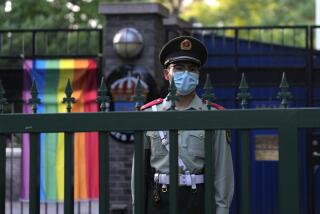Quake activism quieted by China
- Share via
CHENGDU, CHINA — When a powerful earthquake flattened much of Sichuan province a year ago, community organizer Zhang Guoyuan seized the moment. Within days, he was running an aid center and warehouse, coordinating 700 volunteers and taking in $1.6 million in donated food, medicines, supplies and cash.
Then the police told him to stop.
The catastrophic earthquake on May 12 set off an unprecedented surge of volunteerism in China. But the government, always wary of groups beyond its control, has since sought to restrain it -- with considerable success.
“From the government’s point of view, they’re worried. They’re afraid we’ll do something,” said Zhang, 29. “Really all we’re trying to do is make society better.”
The Chinese leadership has long restricted private activist groups, known as nongovernmental organizations, or NGOs. After watching popular movements oust autocratic governments in Ukraine, Georgia and elsewhere this decade, the government redoubled efforts to prevent such groups from becoming a social force that could challenge its authority.
Activists had hoped the quake would change that, opening up more space for private efforts to flourish.
Instead, the magnitude 7.9 quake unnerved the government. Among the 90,000 dead and missing were large numbers of students, sparking outrage about badly built schools and raising the prospect of protests.
Now, a year later, hard-to-navigate rules and official suspicion have left groups underfunded and reliant on the government. The wave of volunteerism has largely dissipated.
But activists are eking out some gains in the quake’s aftermath. Beijing is allowing the state-backed Chinese Red Cross Foundation to provide a few, better-established groups with funding for the first time.
Overall, however, Beijing has monopolized the reconstruction, allowing the government to claim credit and ensuring that NGOs don’t morph into a political force.
More to Read
Sign up for Essential California
The most important California stories and recommendations in your inbox every morning.
You may occasionally receive promotional content from the Los Angeles Times.










